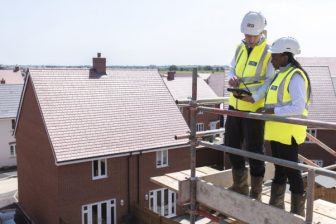 New housing starts have increased significantly, reaching a near 50-year high as housebuilders sought to beat a net zero deadline.
New housing starts have increased significantly, reaching a near 50-year high as housebuilders sought to beat a net zero deadline.
According to new government data, developers started construction on 73,600 new homes during the second quarter of this year, up 34% compared to the corresponding period last year and the highest quarterly total on record since at least 1978.
Developers were under pressure to start projects ahead of a 15 June deadline that saw new homes subject to onerous regulations designed to cut carbon emissions from buildings.
Housing starts since mid-June are subject to the Future Homes Standard, which requires buildings to have low carbon technology installed, such as charging points for electric vehicles (EVs).
Andrew Wishart, head of housing service at Capital Economics, said: “Builders began work early to avoid having to conform with the Future Homes Standard.”
Under the rules, projects are exempt from the regulation so long as they began before the June deadline. It means housebuilders can start a project but are under no obligation to swiftly finish the scheme.
While new starts surged during Q2 2023, the number of housing completions dropped by 12% to 40,720 between April and June as developers slowed activity in response to a weak property market.
Wishart believes the hike in new starts will swiftly fall. Capital Economics forecasts housing starts will drop to just 15,000 between July and September. This would be the lowest quarterly total on record and nearly a tenth less than the low recorded during the depths of the financial crisis.
“Monthly data from the National House Building Council shows that housing starts being brought forward led to a collapse in starts in July and August,” Wishart added.
Capital Economics expects builders to make a start on 140,000 new homes this year, down a fifth compared to 2022 and less than half the government’s target of building 300,000 new homes a year.
To add, Wishart forecasts that housing starts will plummet to just 107,000 next year, which if accurate would be the lowest level of residential construction since 2012, following the global financial crisis.


Aaaarrrggghh!
Firstly, whilst the new carbon emission regulations may “seem” onerous in comparison to the past regulations, they actually don’t really go far enough considering how climate change seems to ramping up. Plus, the changes to construction will mean lower ongoing costs to the owners. If the developers are clever they will recoup the additional costs! However, that’s not really the reason I decided to comment.
A prediction for 2023 of a total of just 140,000 houses built is shockingly bad.
Apparently, in 2022, only 175,000 houses were built, which really isn’t much better, especially considering how favourable the market was last year.
107,000 houses in 2024 – blimey!
But of course the target of 300,000 – which actually isn’t enough anyway, has always just been a smoke and mirrors ploy.
The economy of this country revolves around the restricted number of properties that are available.
There are very few places on the planet where property values double every 10 years or so, even through boom and bust cycles.
This insanity has to stop!
You must be logged in to like or dislike this comments.
Click to login
Don't have an account? Click here to register
It is called supply and demand
In a country that is hugley overpopulated prices will increase over a 10 year period
You must be logged in to like or dislike this comments.
Click to login
Don't have an account? Click here to register
You are absolutely right. But that doesn’t mean that we shouldn’t do something about it.
You must be logged in to like or dislike this comments.
Click to login
Don't have an account? Click here to register
remove illegals – reduce immigration
STOP building on farms – the world is going to be overpopulated we need to take control of our own food supply or the future for peopole here is desperate
You must be logged in to like or dislike this comments.
Click to login
Don't have an account? Click here to register